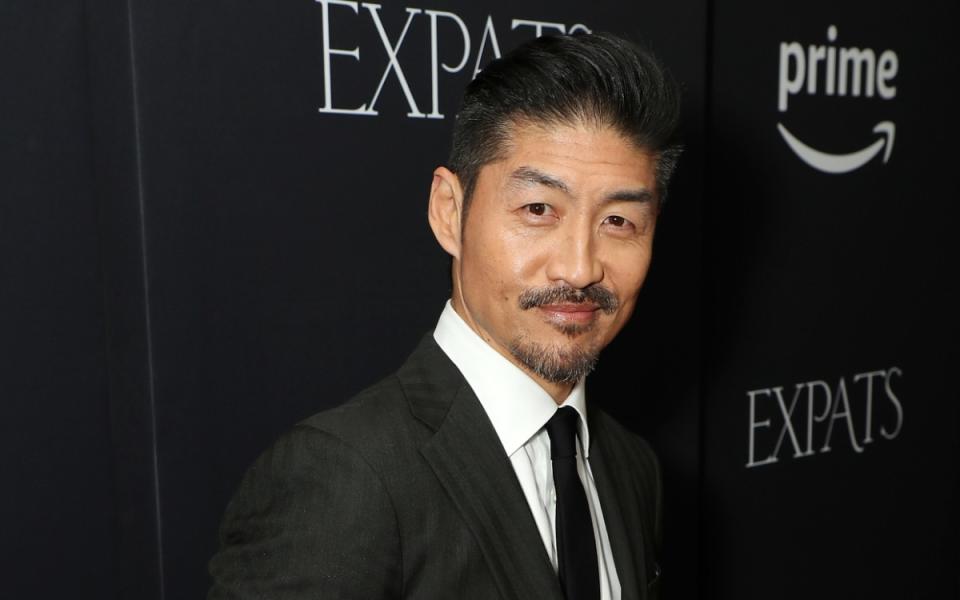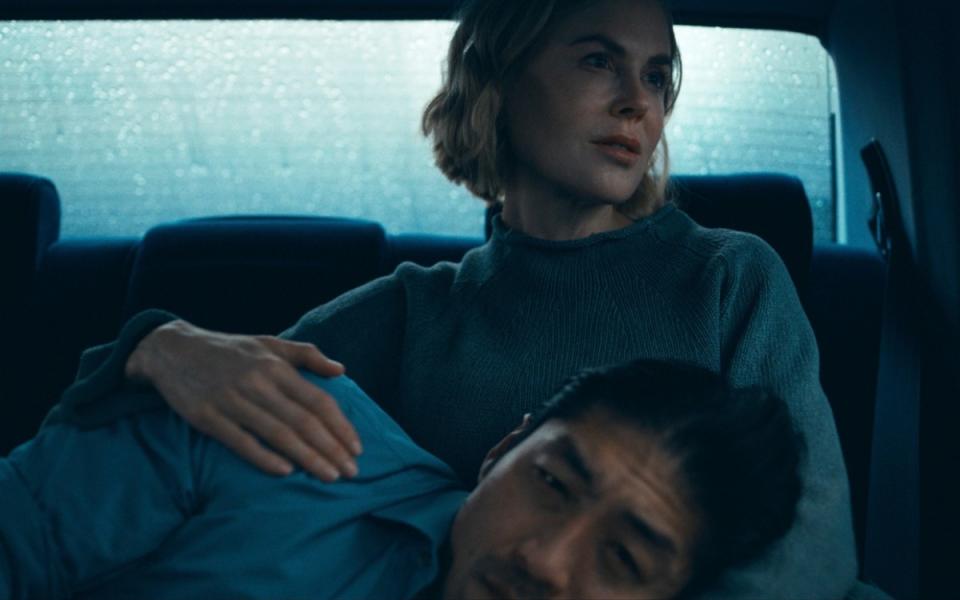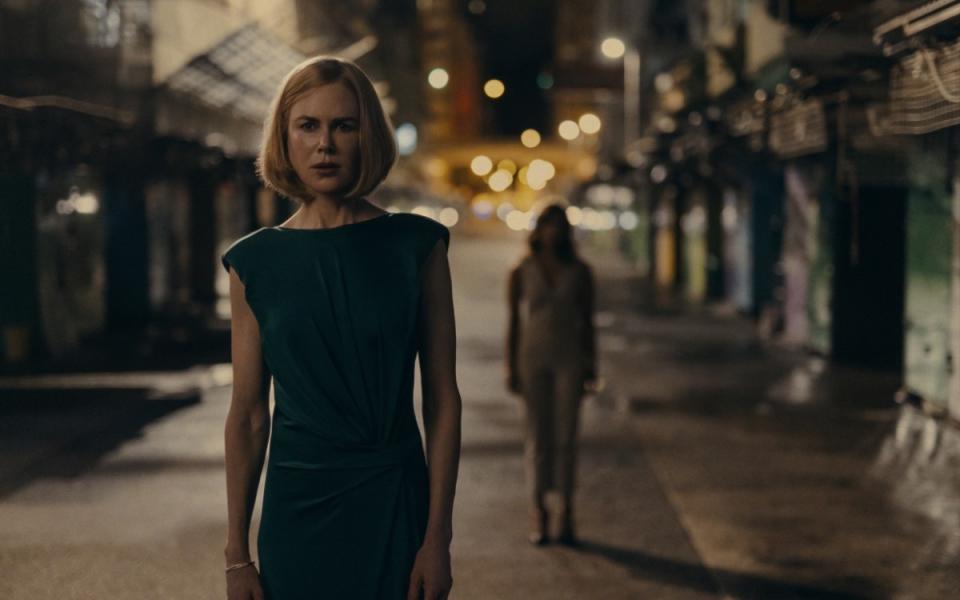'Chicago Med's Brian Tee on Teaming Up With Nicole Kidman in Hong Kong for 'Expats'

- Oops!Something went wrong.Please try again later.
- Oops!Something went wrong.Please try again later.
- Oops!Something went wrong.Please try again later.
Brian Tee, Nicole Kidman
Expats, the six-part limited series based on the international bestselling novel The Expatriates by Janice Y. K. Lee, is set against the complex tapestry of life in Hong Kong and examines the stories of three women—all expatriates—whose lives become entwined after an encounter sets off a chain of transformative events that leaves everyone navigating the intricate balance between blame and accountability.
Directed by Lulu Wang and set in 2014, Expats is the story of Margaret (Nicole Kidman), Hilary (Sarayu Blue) and Mercy (Ji-young Yoo)—three American women living in Hong Kong whose lives intersect following a sudden family tragedy.
The series questions privilege and explores what happens when the line between victimhood and culpability becomes blurred. Brian Tee plays Margaret’s husband Clarke and Jack Huston plays Hilary’s husband David.
In Parade's interview with Tee, the Chicago Med alum talks about hanging up his scrubs in favor of a business suit for the role of Clarke, how working with Kidman takes him to a new level, filming in Hong Kong, and how The Expats is an examination of humanity.
Related: Queen of the Prestige Miniseries, Nicole Kidman, Is Back in Expats
This is quite the project. It’s not billed as a thriller, but it kept me on the edge of my seat wanting to know what was next. What was it like when you were filming it?
I think it’s some of the most, if not the most, elevated work I’ve ever been a part of, to be completely honest. I think all the feelings that you were feeling were completely intentional. It’s a human story with human elements that we all can relate to. Lulu really brought her sense of humanity to everything. It has these universal themes that we all connect to that we really didn’t know we could through different perspectives. I think that’s the genius of Lulu and the genius of this project.

Marion Curtis/StarPix for Amazon MGM Studios
We have the three women—Margaret, Hilary and Mercy. But the men have complex roles in this, too. What was it about Clarke that made you want to play him?
First and foremost, it’s Lulu Wang. I’ve been a big fan since The Farewell. The Farewell was cathartic to me. I have an incredible relationship with my grandmother and watching that movie was this process of grief. I was bawling buckets of tears, so I wanted to work with Lulu.
Then coming across this incredible writing, again, some of the best writing I’ve ever had the privilege to be a part of. Then the character was one that I can completely relate to because I’ve never played a father before, but I am a father in real life. I took a lot of my personal essence as a part of Clarke. For me, it was just this wonderful connection of craft and artistry and an elevation of work that I aspired to be a part of and I am very blessed to be sitting here now talking about it.
There have been some great movies that examined marriage relationships like Scenes from a Marriage and Kramer vs Kramer, I think this may get added to that list. In this instance, a tragedy causes major damage to Margaret and Clarke’s marriage even though they still love each other. They’re dealing with their grief in different ways. Is that why they’re having a problem connecting with each other?
I think everyone processes grief in different ways. We’ve spoken about having different levels of grief. I think as far as this story is concerned, it is that push and pull. These two individuals absolutely love each other. They’ve spent a lifetime together; they’ve created this wonderful family together. When tragedy does strike, it’s really how you deal with it and how you hold that unit together. Though they’re going in separate directions, I think that’s what really creates the complexity of their relationship.
For me, that’s something that I’ve never been a part of. Yet it’s something that I feel is so universal in so many different ways. I think what Lulu has done is bring the perspective of humanity. There’s no right or wrong and there’s no one way to deal with anything. I think individuals are different. I think it’s trying to connect to that understanding of one another, and especially that understanding of humanity, that really brings this series up to a different level and it is what audiences will gravitate towards as they watch this.
Related: Alan Ritchson on How Season 2 of Reacher Delves into the Past to Solve Murders in the Present

Courtesy of Prime Video
Also, blame is such a big part of this. Margaret because she blames herself for not being a good enough mother and Clarke blames himself because he’s Asian. So the story touches on racism, entitlement, and political correctness. So many themes. Do you think there’s one theme that runs throughout the whole thing?
I think there’s many themes. I think it’s everything that you talked about and more. I think the theme is humanity and I think it’s connecting to that. I think the themes are that everyone comes from different backgrounds and has different experiences. The way that you deal with them is your own in that sense.
What I love about this story and this show and what Lulu has done, and I’ve said it time and time again, is that universal quality that people understand and connect to. I hope that when people watch it, it is like an extension of themselves through whichever character they relate to the most, or even characters that they didn’t think they related to but yet as far as their human instincts are concerned can completely be close to and understand.
It is that sense of understandity—I just coined a new word. Humanity and understanding, understandity. I kind of like that. That sense of understanding to draw bridges so that when we do walk through life, we can have that empathy towards one another that I think we all need.
You talked about this being your most elevated work. You were partnered with Nicole. What was she like as an acting partner?
She’s great. We all know that Nicole brings such an elevated persona, artistry and craft and, obviously, talent to her work. You as an artist and an actor only hope that your journey rises up to that level. For me, it was an absolute blessing to be working opposite her because once we were together, we’re on an even playing field because she allows it and opens ourselves up to go further. One of the wonderful things about working with Nic, is because she’s so giving in that way. Her bar is set so high. When you meet it, coming together, we just want to go further than you can possibly go.

Courtesy of Prime Video
Hong Kong itself is a character in this. There was some controversy while you were filming there. What was it like on the set? Did you feel any tension?
It was an asset. I loved it. I think being in Hong Kong really allowed our characters to try to feel the environment, to assimilate to being expats, to really get that on-screen relatability that sometimes you can’t really manifest until you’re there. For an actor, it’s the best thing. Lulu created such a warm and inviting environment that it was a privilege and a pleasure to be on set every day. I loved shooting in Hong Kong. It was such an additive element for me as an actor to really lean into and really delve deep because we were in Hong Kong itself.
There was such a focus placed on the fact that Mercy was Korean, not Chinese. I didn’t understand why her not being Chinese was such a big deal.
I think that was a point where we were saying that not all Asians are the same. We come from different backgrounds, we come from different cultures, and we’re not a monolith. In our story, even though we may look similar in a sense, we all come from different backgrounds and have different life circumstances. Even being Korean in Hong Kong, you still feel like an expat. That was very poignant to cast Mercy and very poignant in the story and in the show, that we can all still feel very lost even in a visual level if we feel somewhat similar to that particular environment.
I think it’s a universal feeling when someone, anyone, can go into a foreign land or a country and feel a little bit lost and out of place. I think it’s a universal theme, not just for Asians, not just for Koreans or Chinese, for anybody. I think it’s all across the board.
The Expats begins streaming the first two episodes on Jan. 26 on Prime Video, with new episodes launching weekly until the finale on Feb. 23, 2024.

